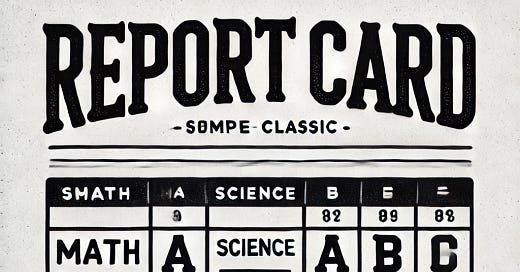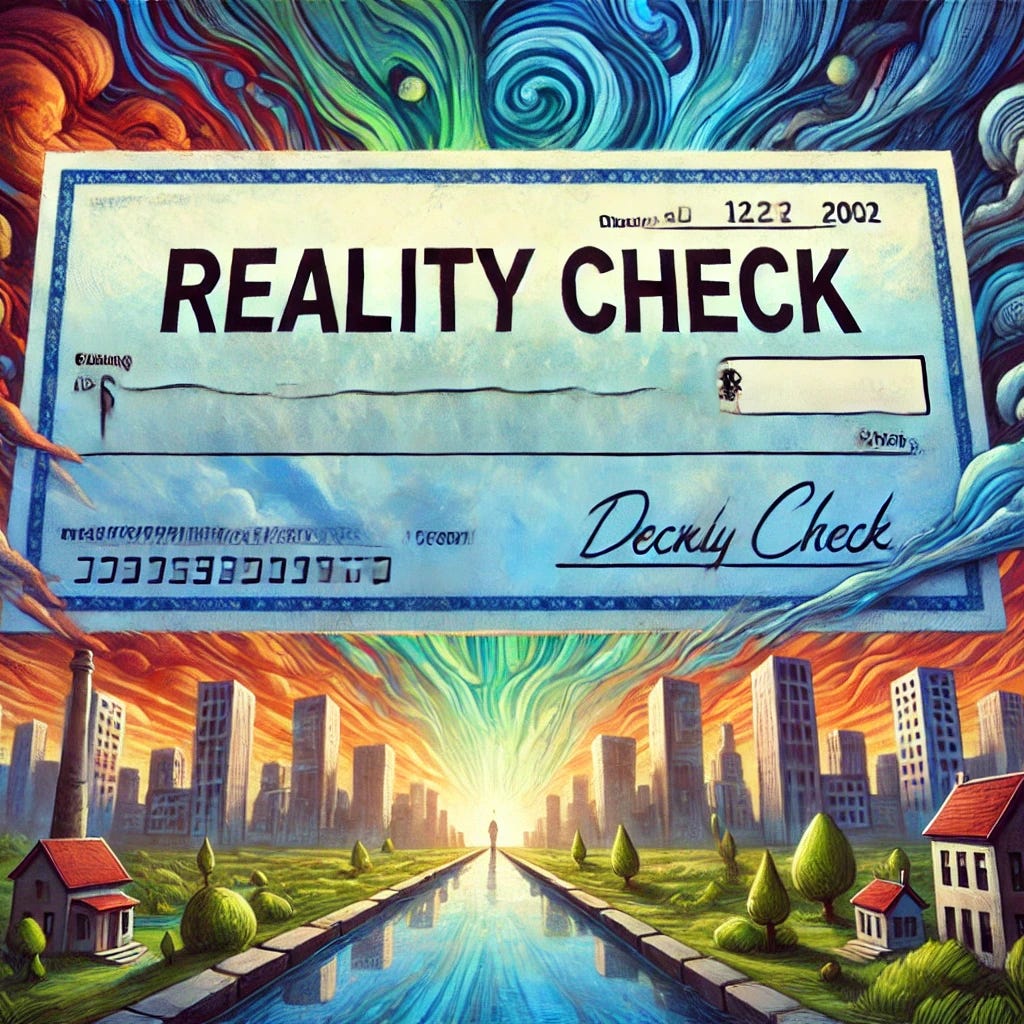Annual Reviews 101: Get Value from the Feedback
It's annual review season, and while many see it as an administrative chore, there's value in it if you look hard enough.
The weather is getting (slightly) cooler, the air is getting dryer, it won’t be snowing thanks to climate change but you will still see Christmas decorations going up. That’s right, it’s annual review season for the white collar workforce.
Annual reviews are a pain - there’s no denying that. Additionally, there’s plenty of research showing that annual reviews alone don’t really move the needle on worker performance. All of that said, if you focus on the right aspects of them there’s plenty of value to find.
Connect More than Yearly
When I was both in high school and college, I made honor roll my senior year in the spring - it was the only time I had that distinction. This is a time when most students take their foot off the gas, but for reasons still not clear to me I instead went the other way. Whether it was the lack of competitive pressure or an unspoken yearning for something that would soon be gone (I’ll figure it out with my therapist), it allowed me to put it on my resumes and transcripts and say that in the most recent semester I had made honor roll. That recency bias didn’t lead to questions about how many other times I had made it - lucky for me.
It’s similar with annual reviews. Did you crush Q4 even if you were mediocre throughout the earlier part of the year? Your review is very likely going to be better than someone who dominated Q1-Q3 but flagged a bit in Q4. Recency bias is one of the most common ways our brains trick us into misreading the facts in front of us.
Instead of meeting once every 52 weeks to talk performance, more frequent feedback needs to be given throughout the year. If I mess up in June, the last thing I’m going to want to do is dissect it six months later - never mind the fact that I highly doubt I’ll maintain the proper context to actually remedy the problem if it’s systemic, but infrequent. Feedback needs to be, among other things, targeted and timely. Annual reviews make this difficult.
On top of the recency issue, there’s the problem of these reviews focusing on activity as opposed to outcomes. Too often they devolve into how many reports went out to a client, or how many cold calls a sales rep conducted, or how many decks we made. For managers, the feedback tends to be behavioral - especially in 360 reviews which are entirely based on the feelings of another team member.
The focus should be more on the team’s outcomes and the individual’s contribution to that. If someone hit all their numbers but the team as a whole flagged, further investigation is needed to see if this person actually outperformed in spite of a bad team or because of it. Departments should be winning championships, not creating MVPs.
Forget the Weakness, Focus on the Strength
Everyone’s favorite behavioral psychologist Adam Grant has a lot of research about feedback and focusing on leaning into your strengths as opposed to shoring up your weaknesses. This might seem counterintuitive - of course I have to make my weaknesses better so they’re not weaknesses anymore, you might say.
But the reality is that we tend to ignore our strengths in favor of our weaknesses coming out of the annual review. Instead of doing what we do really well, we focus on getting our weak skills into (at least) mediocre range to score better on the next annual review. This is the wrong way to go about it.
Learn what your strengths are (and reviews are an excellent time for that conversation) and begin flexing them. Keep in mind that completely ignoring your weaknesses and constantly focusing on what you’re good at will never get you out of your comfort zone and will stall growth. Use your strengths wisely and in the correct situations rather than simply defaulting to them.
And those weaknesses? They do need some buttressing, but only so much to avoid their devolution into fatal flaws. There’s no good test for when a weakness becomes a fatal flaw, but think of it like a house: if the weakness is the finishes in the kitchen, you can live with that. If they’re cracks in the foundation you cannot. Find ways to get better at them, but make sure it’s not at the expense of using your strengths in ways that add value to the company, your career, or both.
Mind the Gap
Another crucial task during review season is to compare your self-evaluation to how your manager and peers rated you. The areas with the biggest gaps are the ones that need to be addressed immediately. If you’re living in a reality that those around you aren’t, it could very well derail your career.
There’s two ways this can become apparent: if you think you’re god’s gift to deck making and the majority of the feedback says you need to work on decking, you need to check you ego and make sure you’re operating on the same facts as everyone around you. If you find yourself here, it’s time for a reality check.
Then there is the other side of the coin, where you think you’re utterly terrible at your job, but those who work with you see a competent and able employee doing well in their role. For this kind of gap, you’ll need a healthy dose of optimism and to take a deep breath or two because you’re actually doing well. Be kinder to yourself.
Ideally, you’d have a similar sense of your performance as your peers and colleagues, and there isn’t necessarily a preferable gap between your self evaluation and the rest of your feedback. But keeping an eye out for that disconnect and diagnosing which one it is will be crucial to tackling the problem head on.
See You Next Year
Annual reviews alone aren’t very valuable, but by keeping an eye out for certain nuggets like strengths vs. weaknesses, the gap between self-evaluations and your colleagues’ views, and agreeing on a cadence with your manager on more timely and relevant feedback moving forward you can extract value out of them anyway. Happy feedback season!
Grab Bag Sections
WTF Securitas: I had the privilege of attending the Shamrock Series with a group of lower Westchester dads this weekend. While Army may have lost, the real losers were actually the ticketholders trying to get in for kickoff. I’m no stranger to live sporting events, but in my nearly four decades of sports fandom Saturday was the worst experience getting into a stadium - by a country mile.
You would think that a stadium like Yankee - an ode to capitalism that removed any character and charm of the old stadium and replaced it with opportunities to buy things - would want ticketholders inside to spend those hard earned simoleons on Bud Light tallboys. You would be wrong. I still don’t quite understand the strategy, but there were no lines, simply masses of people standing and a few scattered portable steel crowd gates in the cold as the wind whipped off of the Harlem River and a solitary Securitas employee said into his bullhorn to “move two steps to the right.” I’ve had three days to decipher this and I still do not know what he meant.
Thirty minutes later we finally got in, missed the first 14 points, and enjoyed fewer brews than we would have given the lack of ability to simply get into the park. Back of the envelope math (and the insane cost of beer) this has to be a six-figure miss to save a much smaller amount of money on a pared down gate staff. Not to mention the creation of a high-risk crowd situation in the name of “security” (we eventually walked through a potentially operational metal detector that seemed to fail to detect any actual metal). They made the TSA look efficient - and that’s hard to do. At least we got to keep our shoes and jackets on?
Album of the Week: If you know Musiq Soulchild, you probably know him from his album Juslisen - a tour de force of neo-soul that debuted at number 1 on the Billboard 200 and earned a Grammy nom. But before that album was his debut Aijuswanaseing, which had a more gradual slope into commercial success (both albums went platinum.)
Aijuswanaseing is an ambitious debut for the previously unknown singer out of Philly, who tackled a wide range of topics across the album. There’s “Girl Next Door” where his childhood neighbor turns out to be quite attractive once they grow up, there’s “Just Friends (Sunny)” where Musiq is trying to befriend a woman, hoping it leads to more later, and there’s “Mary Go Round” where Musiq is incredulous that his girl slept around on him. Some more highlights include the beautiful “143” (the two vamps before the outro are incredible), a song Matt Gaetz probably should have given a listen to in “Seventeen,” and finally there’s the age-old question posed in “L’ is Gone.”
Take a trip back to Thanksgiving 2000 around when this album came out and revisit a classic from the height of neo-soul’s commercial appeal.
Quote of the Week: “True intuitive expertise is learned from prolonged experience with good feedback on mistakes.” - Daniel Kahneman
See you next week!









